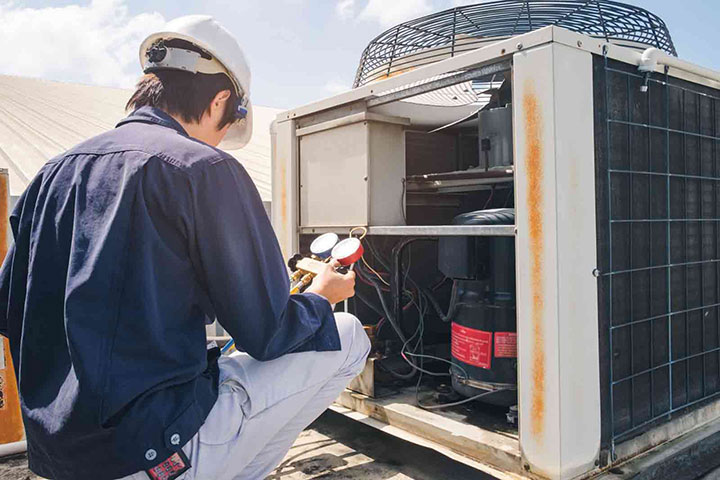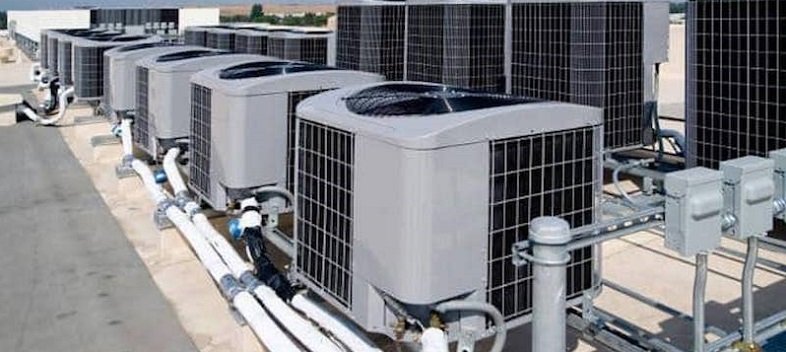The Ultimate Breakdown of ductless mini splits vs Central Heating Systems
The Ultimate Breakdown of ductless mini splits vs Central Heating Systems
Blog Article
Selecting In Between a Heatpump and Heating System: Key Considerations for Your HVAC Requirements
When assessing home heating options for a/c requires, the choice between a heatpump and a heater can be complicated. Each system provides distinct benefits customized to details environments and power effectiveness objectives. Recognizing these differences is vital for making an enlightened choice. Secret variables such as installment prices and environmental effect additionally complicate the selection process. Which choice truly lines up with one's convenience and sustainability choices? The complying with sections will discover these considerations in detail.
Recognizing Heat Pumps: Just How They Function and Their Benefits
While numerous property owners consider various heating options, comprehending exactly how heat pumps function and their benefits can greatly influence their decision. Heatpump operate by moving heat rather than creating it. In the winter months, they draw out warmth from the outside air or ground and move it inside your home, while in the summer season, they reverse this process, cooling the home by removing warm outside. This double functionality makes them versatile for year-round climate control.One of the main benefits of heatpump is their energy efficiency. They make use of significantly much less electricity compared to conventional heater, possibly resulting in lower utility costs (heat pump replacement ooltewah tn). In addition, heatpump have a smaller carbon impact, making them an eco-friendly choice. They also call for less maintenance than standard systems, adding to long-term price savings. In general, comprehending the mechanics and advantages of heatpump can aid homeowners make educated choices regarding their heating and cooling down needs
Checking Out Furnaces: Kinds, Procedure, and Benefits
Furnaces are available in different types, consisting of gas, electric, and oil designs, each with distinct operational devices. Comprehending these differences is essential, as they affect effectiveness and home heating efficiency. In addition, furnaces provide countless advantages, such as consistent warmth output and integrity in chillier climates.
Sorts of Furnaces
Heating unit can vary significantly in design and operation, with furnaces being a preferred option among house owners. There are several kinds of furnaces, each utilizing different fuel resources and modern technologies. Gas heaters are typical, leveraging gas to create warm effectively. Electric furnaces, on the various other hand, use electrical resistance to produce heat, often preferred for their simple installation. Oil heaters, while much less usual, are reliable in areas with restricted gas access (heat pump replacement ooltewah tn). In addition, condensing furnaces make the most of power effectiveness by capturing and recycling exhaust gases. Each kind runs with a system of warmth exchangers and ductwork to disperse cozy air throughout a home. Understanding the distinctions between these heater kinds is important for educated heating and cooling choices
Advantages of Heating systems
For homeowners seeking trusted warmth throughout chilly months, the advantages of heating systems are considerable. Heaters give consistent heating, making sure also temperatures throughout the home. They are especially efficient in extreme cool, often surpassing heat pumps in icy problems. Numerous types, including gas, electrical, and oil heaters, supply adaptability to meet varied demands and preferences.Furnaces likewise often tend to have lower initial installment expenses compared to warmth pumps, making them an extra easily accessible choice for several. Their durable layout adds to a longer lifespan, with several systems lasting over 15 years with appropriate maintenance. In addition, contemporary furnaces are often equipped with innovative innovation for improved performance, which can bring about decreased energy bills. In general, heating systems remain a reputable choice for reliable home heating.

Power Efficiency: Contrasting Heat Pumps and Furnaces
When contrasting power effectiveness in between warm pumps and furnaces, the Seasonal Energy Effectiveness Proportion (SEER) plays a necessary duty in identifying efficiency. In addition, an operational expense analysis discloses the long-term financial ramifications of each system. Recognizing these factors can assist house owners in making educated decisions about their home heating remedies.
Seasonal Power Effectiveness Proportion
Power effectiveness plays a necessary role in the decision-making process between warmth pumps and heaters, especially when thinking about the Seasonal Energy Performance Ratio (SEER) This statistics procedures the cooling performance of heatpump over an entire air conditioning period, providing a standard way to assess performance. Greater SEER scores show greater power efficiency, translating to reduced energy usage and minimized utility bills. On the other hand, furnaces are normally evaluated making use of the Yearly Gas Usage Efficiency (AFUE) rating, which mirrors home heating performance. When comparing these 2 systems, property owners must prioritize SEER ratings for warm pumps, as they straight impact overall power financial savings and ecological sustainability. A complete understanding of SEER can notably affect the long-term satisfaction and cost-effectiveness of the picked HVAC remedy.
Operational Price Evaluation
Understanding the functional expenses linked with heatpump and heating systems is important for house owners evaluating their alternatives. Warm pumps usually supply greater energy performance, converting electric energy into warmth with minimal waste. This leads to reduced regular monthly energy expenses, particularly in modest climates. On the other hand, typical furnaces, especially gas models, may have reduced ahead of time expenses however can incur higher operational expenditures with time as a result of fuel rates and efficiency ratings.Moreover, heat pumps can work as both home heating and cooling systems, potentially reducing the need for different a/c units. While first financial investments for heatpump might be greater, their long-term financial savings in energy performance can make them an extra economical option for many houses. Cautious analysis of local power prices is necessary to establish the ideal alternative.
Setup Costs: What to Anticipate for Each Furnace
Installation costs for heating systems can differ considerably in between warmth pumps and heaters, influencing house owners' decisions. Heat pumps typically have higher ahead of time installation costs, usually ranging from $3,500 to $8,000, depending upon the device dimension and complexity of setup. This includes the outside device, interior handling system, and essential ductwork adjustments. Conversely, heaters tend to have lower first costs, averaging in between $2,500 and $6,000, which can be appealing for budget-conscious homeowners. Nevertheless, installment costs can increase if substantial ductwork is required.Moreover, the choice of fuel kind for heating systems-- gas, propane, or electric-- can also affect setup prices. While heatpump provide power effectiveness, their initial investment may prevent some buyers. Inevitably, assessing setup costs alongside lasting financial savings and efficiency will aid homeowners in making informed choices concerning their heater.
Climate Considerations: Which System Performs Much Better in Your Area
Exactly how do environment problems influence the effectiveness of home heating systems? The performance of heat pumps and heaters can vary considerably relying on the neighborhood environment. In modest environments, heat pumps succeed by effectively moving warmth from the outdoors air, making them an energy-saving alternative. Their efficiency diminishes in incredibly cold temperature levels, where they might have a hard time to extract sufficient heat. Conversely, heaters, particularly gas versions, provide reliable and consistent warm no matter of outside problems, making them better in colder regions.In locations that experience milder winters months, heatpump can run properly year-round, giving both heating & cooling. On the other hand, areas with extreme wintertimes often gain from the effectiveness of heaters. Ultimately, comprehending the neighborhood climate is important when determining between a warmth pump and a heater, as it straight affects their operational effectiveness and general efficiency.
Upkeep Requirements: Long-Term Take Care Of Warm Pumps vs. Furnaces
While both warmth pumps and heaters call for routine maintenance to guarantee peak efficiency, their details requirements and treatment regimens vary substantially. Furnaces normally need much less regular attention, with annual examinations sufficing to look for gas leaks, clean filters, and analyze general functionality. Their easier layout often enables straightforward repairs.In comparison, heatpump demand biannual maintenance because of their twin duty in cooling and heating. This includes cleaning coils, checking cooling agent degrees, and ensuring that both the exterior and interior units function at their finest. Additionally, warmth pump maintenance typically involves even more detailed components, making expert maintenance essential.Neglecting maintenance can lead to lessened performance and increased energy expenses for both systems. Inevitably, property owners must think about these long-lasting treatment demands when selecting between a warm pump and a heater, as proactive maintenance can expand the lifespan and performance of either system significantly.
Environmental Influence: Choosing a Lasting Home Heating Option
The environmental impact of heater is an important analysis for home owners seeking sustainable choices. Warmth pumps are usually extra energy-efficient than traditional heating systems, as they transfer warm as opposed to produce it, considerably minimizing carbon emissions. By using renewable resource resources, such as geothermal or air-source warm pumps, home owners can further minimize their environmental footprint.On the other hand, gas furnaces discharge greenhouse gases and add Recommended Site to air pollution, though they typically offer higher warmth output. Developments in innovation have led to the development of high-efficiency heaters that minimize emissions.Ultimately, selecting a home heating system involves weighing performance versus ecological impact. Property owners are encouraged to review regional energy resources and incentives for sustainable systems, guaranteeing a selection that lines up with both individual comfort and environmental duty. The decision influences not only prompt comfort yet also lasting sustainability and environmental health and wellness.
Frequently Asked Concerns
How Much Time Do Warmth Pumps and Furnaces Normally Last?
The lifespan of warm pumps generally varies from 15 to 20 years, while heating systems can last between 15 to three decades. Normal maintenance considerably influences their durability and efficiency in offering home heating remedies.
Can I Make Use Of a Heatpump in Extremely Cold Climates?
Heatpump can run in incredibly cold climates, yet their efficiency decreases as temperatures drop. In such problems, supplemental heating resources may be needed to keep comfy interior temperature levels and ensure peak efficiency.

What Is the Noise Level of Warmth Pumps Versus Furnaces?
The noise levels of warmth pumps and furnaces differ significantly. Generally, linked here heatpump operate even more quietly than typical heating systems, making them more suitable for those conscious sound, while heaters may generate louder operational sounds during heating cycles.
Are Warmth Pumps Suitable for Both Home Heating and Cooling?
Warm pumps are indeed ideal for both cooling and heating (ductless mini splits). They function by transferring warmth, giving effective temperature level control year-round, making them a flexible selection for property owners looking for an all-in-one heating and cooling remedy
What Size Heating Unit Do I Required for My Home?
Determining the proper dimension heating system for a home needs reviewing factors such as square video footage, insulation top quality, local climate, and the home's design. Consulting a specialist can assure an accurate evaluation and suitable convenience. Heat pumps normally supply higher energy efficiency, converting electrical power right into warmth with marginal waste. In modest climates, heat pumps excel by effectively transferring warm from the outdoors air, making them an energy-saving alternative. Alternatively, furnaces, particularly gas models, offer trustworthy and regular heat no matter of exterior conditions, making them more suitable in cooler regions.In locations that experience milder wintertimes, warmth pumps can run properly year-round, providing both heating and air conditioning. Warmth pumps are usually extra energy-efficient than traditional furnaces, as they move warmth instead than produce it, significantly decreasing carbon discharges. By utilizing renewable power resources, such as geothermal or air-source warmth pumps, home owners can better decrease their environmental footprint.On the other hand, natural gas heaters emit greenhouse gases and add to air pollution, though click here now they frequently offer higher warmth outcome.
Report this page